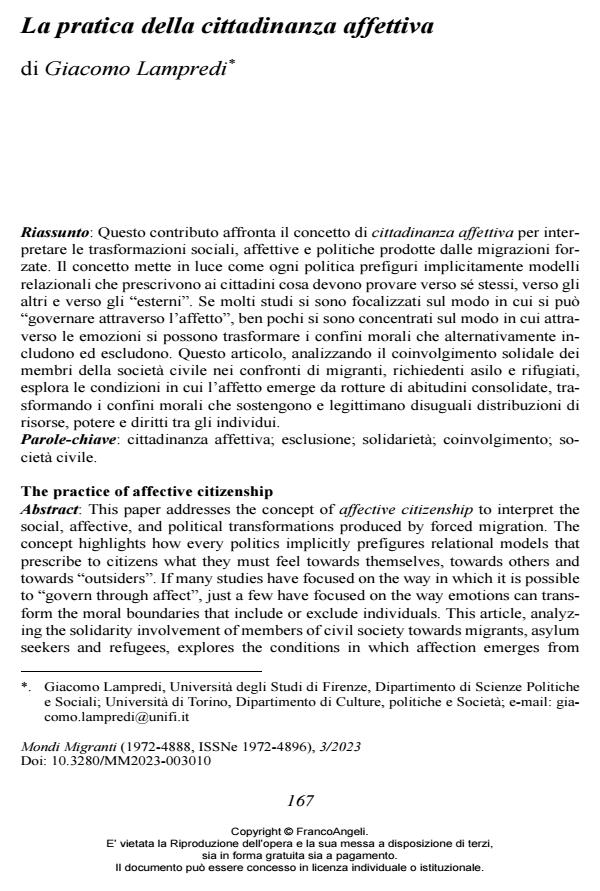The practice of affective citizenship
Journal title MONDI MIGRANTI
Author/s Giacomo Lampredi
Publishing Year 2023 Issue 2023/3 Language Italian
Pages 19 P. 167-185 File size 206 KB
DOI 10.3280/MM2023-003010
DOI is like a bar code for intellectual property: to have more infomation
click here
Below, you can see the article first page
If you want to buy this article in PDF format, you can do it, following the instructions to buy download credits

FrancoAngeli is member of Publishers International Linking Association, Inc (PILA), a not-for-profit association which run the CrossRef service enabling links to and from online scholarly content.
This paper addresses the concept of affective citizenship to interpret the social, affective, and political transformations produced by forced migration. The concept highlights how every politics implicitly prefigures relational models that prescribe to citizens what they must feel towards themselves, towards oth-ers and towards “outsiders”. If many studies have focused on the way in which it is possible to “govern through affect”, just a few have focused on the way emotions can transform the moral boundaries that include or exclude individ-uals. This article, analyzing the solidarity involvement of members of civil so-ciety towards migrants, asylum seekers and refugees, explores the conditions in which affection emerges from broken habits, transforming the moral bound-aries that support and legitimize unequal distributions of resources, power, and rights between individuals.
Keywords: affective citizenship; exclusion; solidarity; involvement; civil so-ciety.
- Ahmed S. (2014). Atmospheric Walls, feministkilljoys blog, 15 September; -- https://feministkilljoys.com/2014/09/15/atmospheric-walls/
- Ahmed S. (2004). The cultural politics of emotion. Edinburgh: Edinburgh University Press.
- Albrecht Y. (2018). Emotional reflexivity in contexts of migration. How the consideration of internal processes is necessary to explain agency. Digithum, 21: 43-53;
- Ambrosini M. (2016). Cittadinanza formale e cittadinanza dal basso. Un rapporto dinamico. SocietàMutamentoPolitica, 7, 13: 83-102; DOI: 10.13128/SMP-1827
- Ayata B. (2019). Affective citizenship. In: Slaby J. e Von Scheve C., a cura di, Affective societies (pp. 330-339). London, New York: Routledge.
- Balibar E. (2012). Strangers as enemies. Walls all over the world, and how to tear them down. Mondi Migranti, 6, 1: 7-25; DOI: 10.3280/MM2012-00100
- Brighenti A.M. (2010). Visibility in social theory and social research. New York: Springer.
- Burkitt I. (2012). Emotional Reflexivity: Feeling, Emotion and Imagination in Reflexive Dialogues. Sociology, 46, 3: 458-472; DOI: 10.1177/0038038511422587
- Candiotto L. e Dreon R. (2021). Affective Scaffoldings as Habits: A Pragmatist Approach. Frontiers in Psychology, 12: 629046;
- Colomy P. e Brown J.D. (1996). Goffman and interactional citizenship. Sociological Perspectives, 39, 3: 371-381.
- de Wilde M. e Duyvendak J.W. (2016). Engineering community spirit: The pre-figurative politics of affective citizenship in Dutch local governance. Citizenship Studies, 20, 8: 973-993; DOI: 10.1080/13621025.2016.122919
- Dewey J. (2020). La teoria delle emozioni. Le attitudini emotive. In: Baggio G., Caruana F., Parravicini A. e Viola M., a cura di, Emozioni: da Darwin al pragmatismo (pp. 127-143). Torino: Rosenberg & Sellier.
- Di Gregorio M. e Merolli J.L. (2016). Introduction: affective citizenship and the politics of identity, control, resistance. Citizenship Studies, 20, 8: 933-942; DOI: 10.1080/13621025.2016.122919
- Elias N. e Scotson J.L. (1994). The established and the outsiders. London: Sage (ed. or. 1965).
- Fortier A.M. (2010). Proximity by design? Affective citizenship and the management of unease. Citizenship studies, 14, 1: 17-30; DOI: 10.1080/1362102090346625
- Gordon S.L. (1990). Social structural effects on emotions. In: Kemper T., a cura di, Research agendas in the sociology of emotions (pp.145-179). Albany: SUNY Press.
- Hochschild A.R. (1983). The managed heart. Berkeley: University of California Press.
- Holmes M. (2010). The emotionalization of reflexivity. Sociology, 44, 1: 139-154; DOI: 10.1177/003803850935161
- Hung R. (2010). In search of affective citizenship: From the pragmatist-phenomenological perspective. Policy futures in Education, 8, 5: 488-498;
- Isin E.F. (2009). Citizenship in flux: The figure of the activist citizen. Subjectivity, 29, 1: 367-388;
- Isin E.F. (2008). Theorizing acts of citizenship. In: Isin, E.F. e Nielsen G.M., a cura di, Acts of citizenship (pp. 15-43). London: Bloomsbury Publishing.
- Isin E.F. (2004). The neurotic citizen. Citizenship studies, 8, 3: 217-235; DOI: 10.1080/136210204200025697
- Johnson C. (2010). The politics of affective citizenship: From Blair to Obama. Citizenship studies, 14, 5: 495-509; DOI: 10.1080/13621025.2010.50670
- Lister R. (2007). Inclusive citizenship: realising the potential. Citizenship studies, 11, 1: 49-61; DOI: 10.1080/1362102060109985
- Merolli J.L. (2016). Manufacturing desire and producing (non-) citizens: integration exams in Canada, the UK and Netherlands. Citizenship Studies, 20, 8: 957-972; DOI: 10.1080/13621025.2016.122919
- Mol A. (2008). The logic of care: Health and the problem of patient choice. London and New York: Routledge.
- Mookherjee M. (2005). Affective citizenship: feminism, postcolonialism and the politics of recognition. Critical review of international social and political philosophy, 8, 1: 31-50; DOI: 10.1080/136982304200033583
- Pratesi A. (2018). Doing care, doing citizenship: Towards a micro-situated and emotion-based model of social inclusion. London: Palgrave Macmillan.
- Tronto J.C. (1994). Moral boundaries: A political argument for an ethic of care. London: Routledge.
- Vrasti W. e Dayal S. (2016). Citizenship: rightful presence and the urban commons. Citizenship Studies, 20, 8: 994-1011; DOI: 10.1080/13621025.2016.122919
- Yörükoğlu I. (2020). Acts of Belonging in Modern Societies. Berlin: Springer International Publishing.
- Young I.M. (1990). Justice and the Politics of Difference. Princeton: Princeton University Press.
- Yuval-Davis N. (2011). The politics of belonging: Intersectional contestations. London: Sage.
- Zembylas M. (2013). Affective citizenship in multicultural societies: Implications for critical citizenship education. Citizenship Teaching & Learning, 9, 1: 5-18;
Giacomo Lampredi, La pratica della cittadinanza affettiva in "MONDI MIGRANTI" 3/2023, pp 167-185, DOI: 10.3280/MM2023-003010